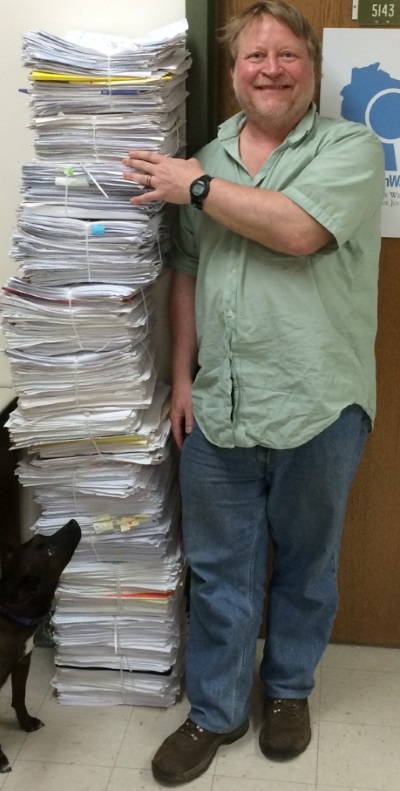How Political Money Corrupts
A columnist says goodbye with thoughts about our money-driven political system and what can be done about it.

Bill Lueders with notes for his nearly 200 columns from the past four years. Photo by Sean Kirkby of the Wisconsin Center for Investigative Journalism.
Regular readers of this column know its fondness for numbers. Here is one more to ponder: This is the 199th offering since the column debuted in June 2011. It will also be the last.
During these past four years, the columnist’s meanderings into the busy intersection of money and politics have appeared in dozens of state newspapers and other media outlets. The newly bundled files for those first 198 columns reach a height of 5 feet, 3 inches, almost as tall as the columnist himself. He thanks his readers for their interest, and occasional kind words.
Being a journalist is about learning, and the columnist has learned a great deal from working at the Wisconsin Center for Investigative Journalism. Now he is moving on to fresh opportunities, including a job as associate editor of The Progressive magazine, launched in 1909 by legendary Wisconsin statesman Robert M. La Follette, a Republican.
Besides encouraging his readers to subscribe to The Progressive, the columnist wishes to impart some final observations:
While money can be a corrupting influence, our political system in Wisconsin is not, as some allege, irredeemably corrupt. As our inaugural column noted, “most people in public office are honorable, despite the nasty things they often say about each other.”
Mark Twain had a great line about Richard Wagner’s music being “better than it sounds.” Our political system is better than you would guess from listening to politicians, the columnist believes, even after four years of immersion in this topic.
But money clearly plays an outsized role in our elections and political process. According to the National Institute on Money in State Politics, Wisconsin state candidates and committees raised $100 million running for office in 2013-14. During that same period, lobby groups in Wisconsin reported spending nearly $60 million to influence state law and policy.
That’s a lot of cash, with no end in sight. Legislative efforts to rewrite Wisconsin’s campaign finance laws will almost certainly lead to higher spending limits and fewer worries for groups engaged in electioneering communications that fall (just barely) short of telling people how to vote.
The Republicans who control the Legislature want to overhaul the Wisconsin Government Accountability Board, the state’s election law overseer. There’s even talk about returning it to partisan political control, a demonstrably flawed model abandoned in the mid-2000s following a massive state scandal.
Meanwhile, the courts are busily beating back restrictions on letting well-heeled individuals and groups spend vast, even unlimited, sums trying to influence elections.
“You can say, ‘Oh gee, I wish people weren’t spending so much money on politics,’ ” Esenberg says. “That’s fine. The question is, what are you going to do about it?”
There actually is something that people can do. We can raise the expectations we have of candidates for office, and ourselves. We can refuse to be led by the nose, as those who pump money into politics would like.
No citizen should ever cast a vote based on a television ad or an attack flyer. We need to be skeptical and discerning consumers of political messaging, asking tough questions like, “Who is paying for this, and should I trust them?”
In fact, not every issue goes the way special interests want, and heavy spending does not always translate into electoral success. No matter how much outsiders seek to influence the process, each individual voter gets to exercise his or her independent judgment.
That is the promise, and challenge, of our democracy.
Editor’s note: This is the final Money & Politics column. Its author, Bill Lueders, is leaving the Wisconsin Center for Investigative Journalism to return to his roots at two Madison publications.
Bill Lueders is the Money and Politics Project director at the Wisconsin Center for Investigative Journalism (www.WisconsinWatch.org). The Center produces the project in partnership with MapLight. The Center collaborates with Wisconsin Public Radio, Wisconsin Public Television, other news media and the UW-Madison School of Journalism and Mass Communication. All works created, published, posted or disseminated by the Center do not necessarily reflect the views or opinions of UW-Madison or any of its affiliates.
-
Wisconsin Lacks Clear System for Tracking Police Caught Lying
 May 9th, 2024 by Jacob Resneck
May 9th, 2024 by Jacob Resneck
-
Voters With Disabilities Demand Electronic Voting Option
 Apr 18th, 2024 by Alexander Shur
Apr 18th, 2024 by Alexander Shur
-
Few SNAP Recipients Reimbursed for Spoiled Food
 Apr 9th, 2024 by Addie Costello
Apr 9th, 2024 by Addie Costello






















Thank you for all you’ve done, through this column and through your work elsewhere, to defend democracy in the State of Wisconsin.
If you take issue with the sums of money spent on elections, your concern lies is not with the process but with the electorate. People must still vote, ne’er has a single dollar bill ever waltzed into a voting booth to complete a ballot.
I wouldn’t be so quick to blame the “electorate.” People are malleable, and they vote based on what they know. When third-party groups convincingly manipulate the media (e.g. the “Wisconsin Reporter”, etc.) and run suave PR campaigns that benefit their chosen candidates, they get the results they want on Election Day. The “electorate” is faced with wolves in sheep’s clothing — do you suggest that the wolves ought to be allowed to do whatever they please, no matter how much mayhem they cause?
Great Britain has an election policy that we should adopt. No radio or television political ads for 60 days prior to and election.
Continued success, Mr. Lueders. (Leuders and Letterman in the same week. I don’t think I can bear it).
TF – It’s the responsibility of the electorate to be informed. If they choose not to, that is their prerogative, not the fault of any third party group. It is entirely up to the electorate. There is, especially now, an almost limitless supply of sources that are extremely easy to find and use for a voter to be informed.
So no rules or regulations whatsoever because Internet?
Why would there be? They are commercials….no different than Coke vs Pepsi or Miller vs Bud. Do we limit spending there? If some group wants to spend $4 million trying to convince me to vote for their guy, why would I want them to stop spending that money? It’s great for the economy and usually has very little to do with my voting. If it influences someone, they have a better ad agent than the other guy. I trust the voter to make up their mind in the way they see fit. Whether or not I like their decision or how they came to it, is of no consequence.
There are already laws that protect against slander and libel, so what other restrictions do there need to be?
Aren’t there regulations on commercials though? Didn’t DirecTV pull the Rob Lowe ads because they contained lies?
Remember when Mitt Romney was responsible for killing a man’s wife? Sometimes lies make it through the system, sometimes, as with DirectTV, they don’t.
Joe, that was a joke on SNL. It’s a problem when “the system” is configured to facilitate the spreading of lies. It’s not right for “advocacy groups” to confuse the crap out of voters and then say, “Hah, hah, suckers — you should have been more watchful!”
TF – it was an actual ad. If people are that easily fooled, that is not the fault of the ads.
If you care about removing the corrupting influence of big money in politics, please pay a visit to Wof PAC. For a relatively young movement, they’ve had considerable success, and I think similar efforts like MayDay PAC, while similar in principle, is less likely to succeed due to its approach; MayDay PAC seeks to reform campaign finance by supporting congressional candidates that support such reform, while Wolf PAC sees that approach as being ‘too little, too late,’ because congress is already so heavily saturated in big money, and congressional candidates are so often dependent on our current system of (effectively) legalized bribery. Wolf PAC instead aims its sights at the local (state) level, by calling for a convention of the states. As previously noted, for a relatively young movement, Wolf PAC has already achieved success in a number of states, even ones that are often regarded as more corrupt or drowning in big-money, like California, New Jersey, and Illinois. Wisconsin has yet to join the list, so if you’re like me and consider campaign finance reform to be paramount to actually making any significant legislative changes, consider donating, volunteering, or calling your local reps seeking sponsors to Wolf PAC-inspired legislation – in my mind, it’s at the heart of nearly every other issue, with big-money in politics acting as a roadblock to reforming everything from environmental policy and defense funding, to international “free trade” and domestic economic issues such as the minimum wage.
To the naysayers that insist that money is speech, and limiting money in politics is akin to limiting free speech, does that also imply that a billionaire has a greater right to free speech than everyone else? It seems to me – and evidence supports – that when an individual or a corporation can single-handedly bankroll a significant portion of a candidates campaign (“indirectly” of course through super PACs, since actual direct collusion is technically “illegal,” even though the FEC has stated time and again that they’re effectively helpless in today’s campaign environment”) it’s absurd to claim that that doesn’t even suggest the appearance of corruption, as one infamous SC justice put it. This is a truly bipartisan issue, and I don’t like the idea of a union or Wall Street significantly influencing a Democrat’s campaign any more than I like big business influencing a Republican’s campaign. Our elected representative are supposed to represent the electorate, first and foremost, yet anyone familiar with politics knows that candidates have to spend an inordinate amount of their time fundraising JUST to be considered a serious candidate. They often spend more time trying to attract member’s of the donor class to support their campaigns than they do actually representing the individuals that collectively voted for them (or voted against them, since Reps must represent their ALL of their constituency). For this reason, it’s no surprise that candidates often make legislative decisions that benefit and further appease those that donated to their campaigns. One relatively recent local example was when Walker passed mining legislation specifically benefiting the now-defunct Gogebic Taconite mine after getting $700,000 worth of support from their parent company, even though he refused to admit knowing they even submitted such a donation.
With all of that in mind, let’s work together, across the political spectrum, to remove the corrupting influence of money in politics by pushing for public financing of elections, ensuring a financially-even playing field so that candidates win support based on the merits of their positions rather than who can afford to spam the airwaves with more attack ads than their opponents or filling our mailboxes with pamphlets and mailers filled with misinformation. As it stands, at the national level, the candidate with more money wins the vast majority of the time. The size of a candidate’s campaign fund and the number and wealth of the (super) PACs that support them should not be a main determinant of who wins, and we can only change that if we work together to make campaigns a war of ideas rather than a war of wallets.
@Andy: Exactly — you’ve nailed it.